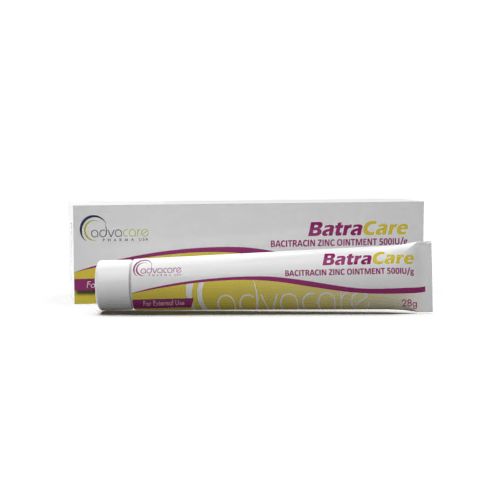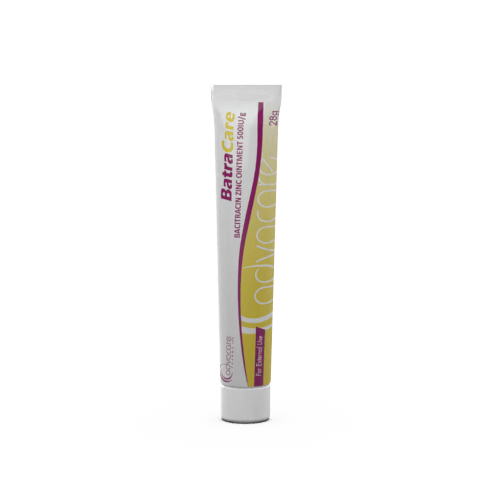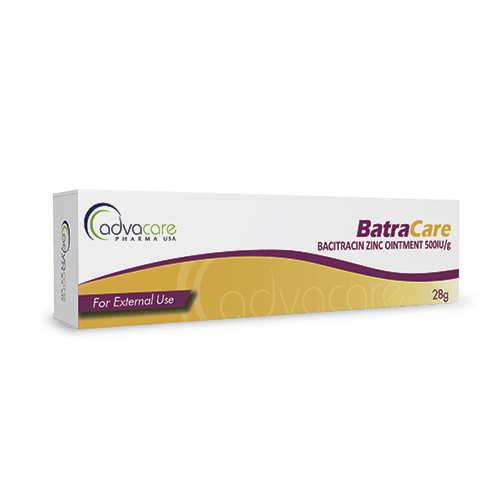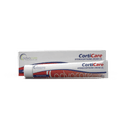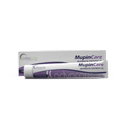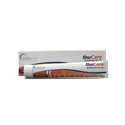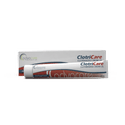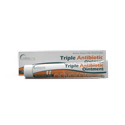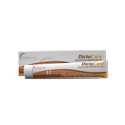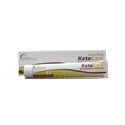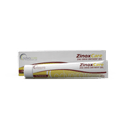- Home›
- Pharmaceuticals›
- Topicals›
- Medical Ointments›
- Bacitracin Zinc Ointment
Bacitracin Zinc Ointment
Form
Dosage
Packaging
What is Bacitracin Zinc?
Active Ingredients: Bacitracin Zinc
Bacitracin Zinc Ointment is a topical antibiotic drug used to treat or prevent infections of the skin that are caused by minor wounds like cuts, scrapes, or burns. It is not effective at treating or preventing fungal or viral infections of the skin. This medication should only be applied topically to the skin.
Bacitracin is a polypeptide antibiotic. It works by interfering with bacterial cell wall growth. This activity stops the growth of bacteria.
Bacitracin Zinc Ointment is a mixture of polypeptides that can prevent the formation of bacterial cell walls and oxidatively cleave DNA. Its duration of action is short and should be given every 3 to 4 hours topically. Bacitracin has an affinity for divalent metal ions such as Mn(II), Co(II), Ni(II), Cu(II), or Zn(II). These complexes interact with C55-isoprenyl pyrophosphate, inhibiting the hydrolysis of lipid dolichol pyrophosphate, which disrupts cell wall synthesis. Bacitracin metal complexes can bind to and oxidatively cleave DNA.
The absorption after topical administration is poor and the data about the volume of distribution of this product is not available. This drug is excreted renally around 87% and the clearance is not well studied.
Bacitracin is also available as a triple ointment cream in combination with Neomycin Sulfate and Polymyxin B Sulfate.
AdvaCare Pharma is a trusted global supplier of Bacitracin Zinc Ointment. We offer a wide range of high-quality and cost-effective medications that are available for distribution. Our factories are GMP-certified and meet the high standards necessary to comply with WHO guidelines and standards.
Why are we a top Bacitracin Zinc manufacturer?
AdvaCare Pharma is a US pharmaceutical company that manufactures Bacitracin Ointment, and our entire range of 50+ topical treatments in cream, ointment and gel dosage forms, under stringent GMP regulations. Our distinctive approach to business fosters a highly collaborative relationship with our pharmaceutical distributors. For the past 20 years we have established a reputation as a trusted Bacitracin manufacturer, one of the 500+ pharmaceutical products in our comprehensive range, across more than 65 global markets.
Uses
What is Bacitracin Zinc used for?
It is used to treat or prevent bacterial infection in minor cuts, scrapes, or burns.
How is Bacitracin Zinc Ointment used?
This medication is manufactured as a sterile ointment, which is intended for topical administration directly to the skin. Do not use it in the eyes, nose, mouth, vagina, or rectum.
Always wash hands with soap and water before and after using this medication. Clean the skin area carefully before applying this topical drug. Only apply to the area that needs to be treated. This drug should not be used on large areas of skin. This topical drug should not be used for more than 7 days.
What dose should be applied?
• Apply only enough ointment to cover the afflicted area, up to 3 times per day. Do not use it for longer than 7 days.
There are no estimated dosages for pediatric and geriatric patients, as well as for those with renal or hepatic impairments, so it is advised to consult a doctor regarding dosing to get individualized advice.
Refer to a doctor or healthcare professional for the exact dosage and duration of treatment.
Who can use Bacitracin Zinc?
Bacitracin Zinc can be used for treating or preventing bacterial infections on the skin. There are no limitations regarding this product.
Pregnant and breastfeeding women should consult a doctor before taking this product. Patients with renal or hepatic impairment as well as geriatric patients should also get personalized advice from their doctor.
Are there any precautions when using this ointment?
Bacitracin Zinc is a topical medicament and should be applied only to the affected area. Avoid close contact with this drug with the eyes, nose, mouth, rectum, or vagina. In cases of contact, flush the area with water for at least 15 minutes.
What should be done in cases of Bacitracin Zinc overdose?
This medication is very safe, but in some cases, it might lead to redness, pain, and itching. Accidental consumption of bacitracin in large amounts might lead to serious stomach upset and even vomiting. In some cases, this drug can also lead to allergic reactions in cases of overdose and it usually manifests with redness and itching.
If you develop some symptoms of overdose, you should stop using this product and if you develop some serious reactions, you should seek emergency medical care right away. If this drug enters the eyes, you should flush them with lots of water for at least 15 minutes.
Gastrointestinal side effects such as stomach upset and vomiting can occur in cases of accidental swallowing off the medication, water or milk might help, but you should consult with a healthcare professional. Do not consume water or milk if you are already vomiting.
Can pregnant women use Bacitracin Zinc Ointment?
Pregnant women should consult with a clinician before using this topical drug. There is not enough scientific evidence about the safety of this drug.
Can Bacitracin Zinc be used during lactation?
It is unknown if this medicament is distributed in milk. Breastfeeding women should consult with a clinician before using this drug.
Is only Bacitracin enough to treat some skin conditions?
It depends on the severity of the case. In some cases, only this topical is enough to completely cure the condition, however, in many other cases, other drugs and supplements are needed.
Other warnings
Patients should consult a doctor before use if they have deep or puncture wounds, animal bites, or serious burns.
Consult with a doctor if the condition persists or gets worse.
Get advice if you develop a rash or other allergic reaction.
How should this drug be stored?
It should be stored at room temperature, away from excessive heating or freezing. It should be also kept out of reach of children and pets.
Side Effects
As with all pharmaceuticals, some unwanted effects can occur from the use of Bacitracin Zinc Ointment.
Common side effects include, but may not be limited to: • contact dermatitis
Serious side effects may include: • signs of an allergic reaction
The most common symptoms of allergic reactions include rashes, itching, and swelling on the face, tongue, and throat. It also includes severe dizziness, and difficulty breathing. Contact a medical professional if you develop some allergic reaction after applying this drug.
Patients allergic to bacitracin might have a delayed cell-mediated contact dermatitis reaction or immediate IgE-mediated reactions to the drug.
Gastrointestinal upset and vomiting might occur when this drug is accidentally swallowed. This condition needs to be managed symptomatically and as soon as possible.
For a comprehensive understanding of all potential side effects, consult a medical professional.
If any symptoms persist or worsen, or you notice any other symptoms, please call your doctor.
Precautions
Do NOT use Bacitracin Ointment if:
- You are allergic to any of the other ingredients.
- You have deep wounds, animal bites, or other injuries that cover large parts of the body.
Bacitracin Ointment should not be used on diaper rash unless recommended by a doctor.
If new infections arise during treatment, appropriate antibiotics or chemotherapy should be initiated.
Before surgeries, patients should inform their doctors if they are using Bacitracin.
Pregnant women should use this medicament only when clearly needed and only if the benefits outweigh the risks. This ointment is generally safe, but pregnant women or those who plan to get pregnant should inform their doctors. The safety of the medicament during breastfeeding is unknown, and breastfeeding women should consult with a doctor before taking it.
Patients should not use this drug for more than 7 days. Prolonged usage of the ointment is not recommended. Prolonged application of bacitracin might cause bacterial resistance and should be avoided because it might cause overgrowth of nonsusceptible organisms including fungi.
This medication might be involved in drug interactions and might increase the risk for serious side effects. This drug is being used only when needed, so if patients miss a dose, it does not lead to serious consequences.
Patients should inform the healthcare provider if they are allergic to bacitracin or if they have any other allergies. If Bacitracin Zinc causes allergic reactions, they should seek immediate help. Patients should inform their doctors about their previous medical history.
The ointment should be kept out of reach of children.
References
Prospective evaluation of topical antibiotics for preventing infections in uncomplicated soft-tissue wounds repaired in the ED
The objective of this study was to determine differences in infection rates among uncomplicated, repaired wounds managed with: topical bacitracin zinc (BAC); neomycin sulfate, bacitracin zinc, and polymyxin B sulfate combination (NEO); silver sulfadiazine (SIL); and petrolatum (PTR).
It is a prospective, randomized, double-blind, placebo-controlled study that included patients who went to the emergency department within 12 hours of injury and did not have puncture wounds, allergies to the agents used, or a history of immunocompromise, were not receiving antibiotics, chemotherapy, or steroids at the time of presentation; had not taken antibiotics within the preceding seven days; did not have an underlying fracture; and were not pregnant as determined by history.
The wound infection rates for the treatment groups were: BAC, six of 109 (5.5%); NEO, five of 110 (4.5%); SIL, 12 of 99 (12.1%); and PTR, 19 of 108 (17.6%) (p = 0.0034).
The conclusion of this study is that topical antibiotics resulted in lower infection rates than the use of a petrolatum control.

You might be interested in...
Why AdvaCare Pharma?
As an industry leader, we are aware of our responsibility to provide affordable and sustainable solutions to improve healthcare worldwide.
